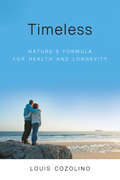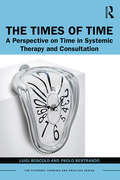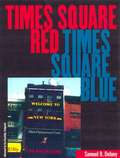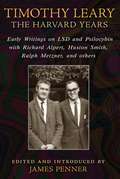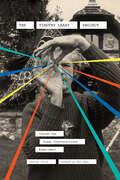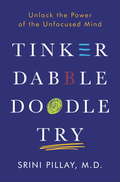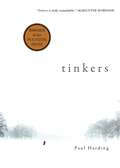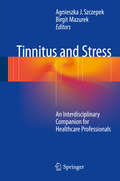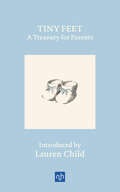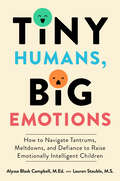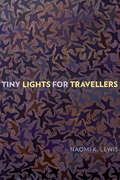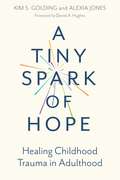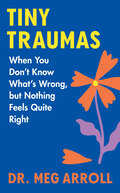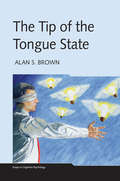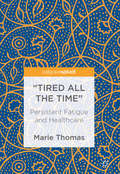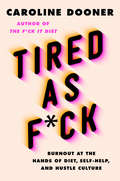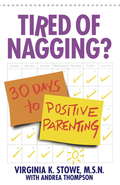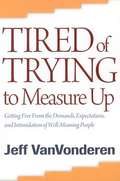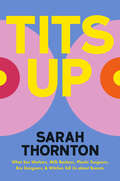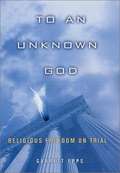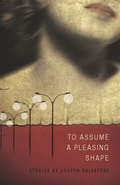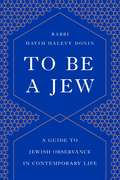- Table View
- List View
Time Warped: Unlocking the Mysteries of Time Perception
by Claudia HammondDrawing on the latest research from the fields of psychology, neuroscience, and biology, writer and broadcaster Claudia Hammond explores the mysteries of our perception of time in her book Time Warped. Why does life seem to speed up as we get older? Why does the clock in your head move at a different speed from the one on the wall? Why is it almost impossible to go a whole day without checking your watch? Is it possible to retrain our brains and improve our relationship with it? In Time Warped, Claudia Hammond offers insight into how to manage our time more efficiently, how to speed time up and slow it down at will, how to plan for the future with more accuracy, and she teaches how to use the warping of time to our own benefit.
Timeless: Nature's Formula For Health And Longevity
by Louis CozolinoUnlocking the secrets of positive aging. Few prejudices in Western society are more powerful than those concerning aging. Until recently, we have assumed that the story of aging is one of loss and decline. But there’s an entirely different truth. Yes, you can teach an old dog—or even a sort-of-old dog—new tricks. Is there a secret to staying young? It turns out that there are many, and they all begin with nurturing our existing relationships to foster brain health, keeping us happier and healthier. As readers of this book will learn, wisdom, enhanced social relationships, greater adaptation and flexibility (mental, if not physical!)—all these things can be attained as we grow older. Filled with both practical and thought-provoking suggestions, this book is a must-read for anyone who wants to age in style.
The Times of Time: A Perspective on Time in Systemic Therapy and Consultation (The Systemic Thinking and Practice Series)
by Luigi Boscolo Paolo BertrandoThis is the most comprehensive study of the role of time in psychotherapy. It illustrates how time is experienced in different ways – individual time, family time, and social time – and how time can act as an invaluable metaphor in shaping clinical practice within a systemic approach, while maintaining connections with other approaches, such as psychoanalysis and cognitive therapies. A seminal volume on this topic, the book looks at issues such as the duration of therapy; the relevance of past, present, and future in therapy; and the balance of memory and oblivion. It also includes a discussion of how time is framed in other disciplines, including sociology, history, and psychopathology, whilst exploring the concept in practical terms through case vignettes and complete case histories, including the transcripts of actual sessions. The reader is thus given a set of guidelines for dealing with time issues in therapy from a systemic perspective. Originally published in 1993, the book has been updated to create a dialogue with contemporary theoretical debates, as well as social and technological changes. It will fascinate all psychotherapists, particularly those interested in a systemic practice.
Times Square Red, Times Square Blue
by Samuel R. DelanyTimes Square Red, Times Square Blue paints a portrait of a society dismantling the institutions that promote communication between classes, and disguising its fears of cross-class contact as "family values." Unless we overcome our fears and claim our "community of contact," it is a picture that will be replayed in cities across America.
Timothy Leary: Early Writings on LSD and Psilocybin with Richard Alpert, Huston Smith, Ralph Metzner, and others
by James PennerThe first collection of Leary’s writings devoted entirely to the research phase of his career, 1960 to 1965 • Presents Leary’s early scientific articles and scholarly essays, including those on the Harvard Psilocybin Project, the Concord Prison Project, and the Good Friday Experiment • With an editor’s introduction that examines the Harvard Drug Scandal in detail as well as a critical preface for each essay On May 27, 1963, Dr. Timothy Leary and Dr. Richard Alpert were dismissed from Harvard University’s Psychology Department--a watershed event marking the moment when psychedelic drugs were publicly demonized and driven underground. Today, little is known about the period in the early 1960s when LSD and psilocybin were not only legal but also actively researched at universities. Presenting the first collection of Leary’s writings devoted entirely to the research phase of his career, 1960 to 1965, this book offers rare articles from Leary’s time as a professor in Harvard’s Psychology Department, including writings from the Harvard Psilocybin Project, the Concord Prison Project, and the Good Friday Experiment. These essays--coauthored with Richard Alpert, Huston Smith, Ralph Metzner, and other psychedelic research visionaries--explore the nature of creativity and the therapeutic, spiritual, and religious aspects of psilocybin and LSD. Featuring Leary’s scientific articles and a rare account of his therapeutic approach, “On Existential Transaction Theory,” the book also includes Leary’s final essay from his time at Harvard, “The Politics of Consciousness,” as well as controversial articles published shortly after his dismissal. With an editor’s introduction examining the Harvard Drug Scandal and a critical preface to each essay, this book of seminal early writings by Leary--appearing in unabridged form--shows why he quickly became an articulate spokesperson for consciousness expansion and an iconic figure for the generation that came of age in the 1960s.
The Timothy Leary Project: Inside the Great Counterculture Experiment
by Jennifer UlrichThe life of Timothy Leary is examined through papers and correspondence preserved in his archive.The first collection of Timothy Leary’s (1920–1996) selected papers and correspondence opens a window on the ideas that inspired the counterculture of the 1960s and the fascination with LSD that continues to the present. The man who coined the phrase “turn on, tune in, drop out,” Leary cultivated interests that ranged across experimentation with hallucinogens, social change and legal reform, and mysticism and spirituality, with a passion to determine what lies beyond our consciousness. Through Leary’s papers, the reader meets such key figures as Allen Ginsberg, William S. Burroughs, Ken Kesey, Marshall McLuhan, Aldous Huxley, John Lennon and Yoko Ono, and Carl Sagan. Author Jennifer Ulrich organizes this rich material into an annotated narrative of Leary’s adventurous life, an epic quest that had a lasting impact on American culture.“A fascinatingly intimate record of how this brilliant, courageous, and awed genius changed our world.” —Michael Backes, author of the bestselling Cannabis Pharmacy“[These notes and letters] portray a brilliant and restless genius who never feared to make mistakes or change his views.” —Ralph Metzner, PhD, coauthor, with Leary and Alpert, of The Psychedelic Experience“Hopefully, these letters show people the real Timothy Leary—an inveterate letter writer who took the time to engage with all kinds of people. Few of us would be as generous.” —R. U. Sirius, cofounder of Mondo 2000 and coauthor of Transcendence
Tinker Dabble Doodle Try: Unlock the Power of the Unfocused Mind
by Srini PillayHarness your mind’s innate tendency to wander, stall, rest, and unfocus and become more productive—in the boardroom, living room, or classroom. To finish tasks and achieve goals, most people believe that more focus is the solution. We rely on to-do lists, calendar reminders, noise-blocking headphones, and sometimes medication to help us concentrate—even though these tactics often fail to substantially improve productivity. Drawing on the latest brain research, compelling stories from his psychological practice, and colorful examples of counterintuitive success from sports, business, education, and the arts, neuroscientist Srini Pillay, M.D., challenges traditional ideas about productivity, revealing the lasting, positive benefits of adding deliberate and regular unfocus to your repertoire. A fascinating tour through brain wavelengths and rhythm, mindsets, and mental relaxation, Tinker Dabble Doodle Try demonstrates how specific kinds of planned unfocus stimulate cognitive calmness, jumpstart productivity, enhance innovation, inspire creativity, improve long-term memory, and, of course, help you stay on target. Tinkering with ideas and with things releases your mind to wander from a state of stuckness into a possibility frame of mind, triggering neural connections and new insights. Dabbling in a new endeavor—whether a hobby or fantasy—disrupts your habitual and reactive thinking, helping you find new solutions to old problems. Doodling can help you tap into another brain frequency to remove obstacles and create opportunities and inspiration. With techniques for training the brain to unfocus, concepts for scheduling busy lives, and ideas for controlling this new cognitive-toggling capability, Tinker Dabble Doodle Try will change how you think about daydreaming, relaxing, leaving work unfinished, and even multitasking. What you’ll discover is a greater freedom, a deeper intelligence, and a more profound joy in your life.Advance praise for Tinker Dabble Doodle Try“Pillay’s effortless writing style, combined with an excellent balance of popular psychology and self-help, makes this a helpful read for those who enjoy a light dive into psychology with practical applications.”—Library Journal“Pillay cites an intriguing range of brain studies to support his argument, and his case studies of individuals with whom he has worked provide useful insights.”—Kirkus Reviews “Dr. Srini Pillay offers a brilliant, deeply researched, and even more deeply imagined blueprint for using one’s full mental armamentarium, conscious, unconscious, and all the undiscovered rest! A fantastic book!”—Edward M. Hallowell, M.D., co-author of Delivered from Distraction “Dr. Pillay’s new book will help you create a new, fun, more playful destiny and unlock your brain’s inner potential.”—Daniel G. Amen, M.D., co-author of The Brain Warrior’s Way “This book not only gives you license to step off the hamster wheel of focus, focus, focus, but it will show you how to strategically and productively do so.”—JJ Virgin, author of JJ Virgin’s Sugar Impact Diet “This brilliant book shows how to manipulate your brain to alternate between intense concentration and deliberate mind-wandering.”—Mark Robert Waldman, co-author of How God Changes Your Brain “Great medicine for those who have long suspected that multitasking and always being on the go aren’t all they are cracked up to be.”—Sara Gottfried M.D., author of The Hormone Cure
Tinkers
by Paul HardingAn old man lies dying. As time collapses into memory, he travels deep into his past where he is reunited with his father and relives the wonder and pain of his impoverished New England youth. At once heartbreaking and life affirming, Tinkers is an elegiac meditation on love, loss, and the fierce beauty of nature. Paul Harding has an MFA from the Iowa Writers’ Workshop and teaches creative writing at Harvard. He lives in Georgetown, Massachusetts.
Tinnitus and Stress
by Agnieszka Szczepek Birgit MazurekThis book provides up-to-date scientific information on the pathways by which psychosocial stress can affect the auditory system and describes current approaches to the management of patients with stress-related tinnitus. The latest evidence is presented on aspects such as the role of stress hormones in auditory function, the effects of allostatic load, circadian sensitivity to auditory trauma, and the association between stress-related biomarkers and tinnitus. The clinically oriented chapters discuss psychometric instruments of value in the tinnitus clinic and present stress-related tinnitus treatment protocols and outcome measures. It is widely acknowledged that the tinnitus percept acts as a stressor. However, it is also now evident that psychosocial stress can play a causative role in tinnitus and that the impact varies according to the level, duration, and quality of the stress. Assessment of the types and levels of stress in tinnitus patients before, during, and after treatment is therefore very important. Healthcare professionals attending tinnitus patients will benefit from the information that this book provides on the relationship between tinnitus and stress and from the practical guidance that it offers.
Tiny Feet: An Anthology
by Lauren ChildAn eclectic showcase of the most influential writing about children from the past four hundred years.Children are a wonder, a blessing, a miracle, and everyone has an opinion on how we should raise them. From novelists to pediatricians and from modern parenting &“experts&” to child psychologists, Tiny Feet is the first anthology of its kind, showcasing a range of the most influential writing about children over the past four hundred years. Published chronologically, the extracts featured in this delightful compendium show the extent to which some of our attitudes have changed while others remain absolute, and remind us of the joy that children have always brought to our lives.Contributors include: Erik H. Erikson on shame and guilt; Marvin J. Gersh on how to raise children in your &“spare time&”; Naomi Stadlen on how parenting books undermine parenting by reducing it to a number of essential tasks; and Donald Winnicott on &“the good-enough mother.&”Plus: memoir, fiction, and further opinion from Daniel Burgess, Jean-Jacques Rousseau, Johann Heinrich Pestalozzi, Isabella Beeton, Charles Darwin, Robert Louis Stevenson, James Sully, Maria Montessori, Bertrand Russell, Margaret Mead, Jean Piaget, Harry F. Harlow, Benjamin Spock, Marvin J. Gersh, Toni Morrison, Lydia Davis, Alison Gopnik, Giuseppina Persico, Cleon C. Mason, Bernardine Evaristo, Ella Cara Deloria, John B. Watson, and Rosalie Rayner.
Tiny Humans, Big Emotions: How to Navigate Tantrums, Meltdowns, and Defiance to Raise Emotionally Intelligent Children
by Alyssa Blask Campbell Lauren Elizabeth StaubleThe Future is Emotionally IntelligentFrom two early childhood experts, an essential guidebook that empowers parents to help their little ones navigate their big feelings—including tantrums, outbursts, and separation anxiety—while laying the groundwork for a lifetime of emotional intelligence.We’re in the midst of a parenting revolution that is radically changing the way we raise our kids. Gone are the days of minimizing emotions: Don’t Cry. You’re Fine. Don’t Make a Scene. As our understanding of developing brains has increased, today’s parents are looking for a new way to help their children understand their feelings and learn to process them.Emotional development experts Alyssa Blask Campbell, M.Ed. and Lauren Stauble M.S. are at the forefront of a movement to foster little ones’ emotional intelligence. Their revolutionary Collaborative Emotion Processing (CEP) method has been a game changer for parents and educators, and now they are sharing it with readers in this indispensable guide. Tiny Humans, Big Emotions provides the tools to tackle every sort of stressful child-rearing situation, including:• What to do when your child throws a tantrum (it's not what you think!)• Helpful scripts to handle any challenging moment like school refusal and bedtime resistance• How to react when your child hits, punches, or bites• Easy tips that help regulate your child’s nervous system• How to anticipate and end meltdowns before they even beginDesigned for all humans—tiny and big—this book shows caregivers of children how to handle their children’s outbursts while empowering them to recognize and manage difficult feelings like anger, sadness, and shame, along with anxiety. All caregivers will find valuable insights and guidance in this book, especially those caring for children from infancy to age eight. Tiny Humans, Big Emotions equips adults with tools for emotional intelligence so they can respond with intention. This innovative, research-based approach teaches children self-regulation and empathy, even as it strengthens the parent-child relationship, setting the groundwork for a lifetime of emotional resilience and wellbeing. This book is an essential, empathetic guide that will teach parents to notice their own habits and hold space for their tiny human's big emotions.
Tiny Lights for Travellers (Wayfarer)
by Naomi K. LewisGovernor General’s Award Finalist: A “wry, moving” memoir of a woman retracing her grandfather’s escape from Amsterdam during the Holocaust (Alison Pick, Booker-nominated author of Between Gods).Why couldn’t I occupy the world as those model-looking women did, with their flowing hair, pulling their tiny bright suitcases as if to say, I just arrived from elsewhere, and I already belong here, and this sidewalk belongs to me?When her marriage suddenly ends, and a diary documenting her beloved Opa’s escape from the Nazi-occupied Netherlands in the summer of 1942 is discovered, Naomi Lewis decides to retrace his route to freedom. Travelling alone from Amsterdam to Lyon, she discovers family secrets and her own narrative as a second-generation Jewish Canadian. With vulnerability, humour, and wisdom, Lewis’s memoir of her journey, interspersed with excerpts from her grandfather’s diary, asks tough questions about her identity as a secular Jew, the accuracy of family stories, and the impact of the Holocaust on subsequent generations.
A Tiny Spark of Hope: Healing Childhood Trauma in Adulthood
by Kim Golding Alexia JonesI could not ignore the tiny spark of hope that whispered to me that there might be someone with whom I could be vulnerable and real, and that this time they might just not let me down...This is the story of Alexia and her therapist Kim, and their three-year therapy journey to begin Alexia's path to recovery. Written from both perspectives, it is a powerful and revealing account of a therapist-client relationship. Together, the authors show the manifold challenges that adult survivors of childhood abuse have to overcome, and offer insight to all therapists on how relational interventions can pave a way to healing.
Tiny Traumas: When You Don't Know What's Wrong, but Nothing Feels Quite Right
by Meg ArrollPsychologist Dr. Meg Arroll offers a much-needed framework for recognizing and combatting the devastating cumulative effects of small everyday wounds—“tiny traumas”—that, like major traumas, can negatively shape our lives.Have you ever felt at a loss for an answer when asked: ‘How are you really feeling?” Maybe you can’t quite put your finger on it, but you know something is definitely off. Microaggressions, challenging family relationships, toxic positivity, work and pandemic stress, gaslighting—these are just a few examples of what psychologist Dr. Meg Arroll calls “Tiny T” trauma. These tiny traumas can slowly build up inside of us, and if ignored for too long, can manifest in our lives as high-functioning anxiety, perfectionism, binge eating, insomnia, broken relationships, and a host of other problems. While advice on healing from major trauma is plentiful, there is little guidance available to help us recover from these “smaller” yet emotionally devastating traumas that are common to all of us. Now, Dr. Meg fills that gap and helps us find peace with this revolutionary guide.In Tiny Traumas, Dr. Meg introduces her three-step AAA approach that allows us to start understanding and healing from these tiny traumas:Awareness: discover your unique constellation of tiny traumasAcceptance: see how these tiny traumas show up in your life and start processing themAction: start taking the steps to actively create the life you desireTiny Traumas teaches readers how to recognize and address past experiences so we can overcome the lasting pain and detrimental effects and truly start living the happier, more peaceful lives we deserve.
The Tip of the Tongue State (Essays in Cognitive Psychology)
by Alan BrownThis book brings together the body of empirical findings and theoretical interpretations of the tip of the tongue (TOT) experience – when a well-known or familiar word cannot immediately be recalled. Although research has been published on TOTs for over a century, the experience retains its fascination for both cognitive and linguistic researchers. After a review of various research procedures used to study TOTs, the book offers a summary of attempts to manipulate this rare cognitive experience through cue and prime procedures. Various aspects of the inaccessible target word are frequently available – such as first letter and syllable number – even in the absence of actual retrieval, and the book explores the implications of these bits of target-word information for mechanisms for word storage and retrieval. It also examines: what characteristics of a word make it potentially more vulnerable to a TOT; why words related to the target word (called "interlopers") often come to mind; the recovery process, when the momentarily-inaccessible word is recovered shortly after the TOT is first experienced; and efforts to evaluate individual differences in the likelihood to experience TOTs.
Tip-of-the-Tongue States and Related Phenomena
by Bennett L. Schwartz Alan S. BrownWhen the memory retrieval process breaks down, people wonder exactly why and how such a thing occurs. In many cases, failed retrieval is accompanied by a "tip-of-the-tongue state," a feeling that an unretrieved item is stored in memory. Tip-of-the-tongue states stand at the crossroads of several research traditions within cognitive science. Some research focuses on the nature of the retrieval failure. Other research tries to determine what tip-of-the-tongue states can tell us about the organization of lexical memory - that is, what aspects of a word we can recall when we are otherwise unable to do so. Still other research focuses on the nature of the experience of a tip-of-the-tongue state. Each of these perspectives is represented in this book, which presents the best theoretical and empirical work on these subjects. Much of the work is cross-disciplinary, but what unifies the topics in this book is that they concern strong phenomenological states of knowing that are not accompanied by recall or recognition of the desired information.
“Tired all the Time”: Persistent Fatigue and Healthcare
by Marie ThomasThis book explores the history, effects, diagnosis and treatment of chronic fatigue as well its significant links to other illnesses. Fatigue is a difficult symptom to accurately assess and quantify due to its subjective nature. Marie Thomas discusses the uncertainties and difficulties in its diagnosis as well as the broader effects of fatigue on quality of life. Fatigue is an increasingly reported problem in primary care, and one that is associated with other chronic conditions as a secondary symptom. Using several case studies, this book describes how in many cases, a patient’s primary condition can be managed; however General Practitioners are left unable to address the fatigue experienced, especially in older adults. Chapters consider the interventions that exist to manage fatigue – especially in the case of Chronic Fatigue Syndrome (CFS) – before highlighting the lack of strategies in primary care for dealing with the problem. In the final chapter Thomas discusses potential interventions and gives recommendations for future research regarding fatigue. This book will be of interest to academics and practitioners in healthcare and psychology, as well as to patient groups and those who care for individuals with fatigue.
Tired as F*ck: Burnout at the Hands of Diet, Self-Help, and Hustle Culture
by Caroline DoonerBlending memoir and blistering social observations, the author of The F*ck It Diet looks back at her desperate attempts to heal her hunger, anxiety, and imperfections through extreme diets, culty self-help methods, and melodramatic bargains with the universe. Offering a frank and funny critique of the cultural forces that are driving us mad, Caroline Dooner examines how treating ourselves like never ending self-improvement projects is a recipe for burnout. We have become unknowingly complicit in perpetuating our own exhaustion because we are treating ourselves like machines. But even phones need to f*cking recharge.Caroline takes a good hard look at the dark side of self-help, and explains how she eventually used a radical period of rest to push back against cultural expectations and reclaim some peace.Tired As F*ck empowers us to say no to the things that exhaust us. It inspires us to carve out time to slow down, feel okay about doing less, and honor our humanity. This is not a self-help book, it’s a cautionary tale. It’s an honest look at the dogma of wellness and spiritual self-improvement culture and revels in the healing power of rest and letting shit go.
Tired of Nagging?
by Virginia StoweWhat do parents do when the child they adore won't listen? They end up nagging, issuing orders, shouting, and sometimes even spanking. But there is a better way, and Virginia K. Stowe, a parent-child educator for more than twenty-five years, shows how to minimize friction and fighting within the household in order to maximize the pleasures of family life.Tired of Nagging? provides thirty easy-to-use tools for solving everyday conflicts, scenarios of commonplace power struggles and illustrations of the tools in action, plus an "ages and stages" guide to a child's capabilities and needs. The readable, practical advice promotes a loving, yet firm approach, one that emphasizes working with the child to eliminate undesirable behavior without inhibiting self-esteem and independence. With Tired of Nagging?, parents can stop losing their patience and begin enjoying to the fullest all the laughter and fun of their child's precious early years.From the Trade Paperback edition.
Tired of Trying to Measure Up: Getting Free from the Demands, Expectations, and Intimidation of Well-Meaning Christians
by Jeff VanvonderenHelp for those who live by unwritten expectations and rules assumed of a 'perfect Christian,' but who instead feel spiritually drained and perpetually guilty. The answer is to stop striving to be a perfect Christian and start living your life for Jesus Christ.
Tits Up: What Sex Workers, Milk Bankers, Plastic Surgeons, Bra Designers, and Witches Tell Us about Breasts
by Sarah ThorntonAn innovative investigation of the five strange worlds that worship women’s chests. After years of biopsies, best-selling author Sarah Thornton made the difficult decision to have a double mastectomy. But, after her reconstructive surgery, she was perplexed: What had she lost? And gained? An experienced sleuth, she resolved to venture behind the scenes to uncover the social and cultural significance of breasts. Riotous and galvanizing, Tits Up excavates the diverse truths of mammary glands from the strip club to the operating room, from the nation’s oldest human milk bank to the fit rooms of bra designers. Thornton draws insights from plastic surgeons, lactation consultants, body-positive witches, lingerie models, and “free the nipple” activists to explore the status of breasts as emblems of femininity. She examines how women’s chests have become a billion-dollar business, as well as a stage for debates about race, class, gender, and desire. Everywhere she turns, Thornton encounters chauvinist myths about this elemental body part that quietly justify deficits in women’s bodily autonomy and endorse shortfalls in their political status. Blending sociology, reportage, and personal narrative with refreshing optimism and wit, Thornton has one overriding ambition—to liberate breasts from centuries of patriarchal prejudice.
To an Unknown God: Religious Freedom on Trial
by Garrett EppsThe people and issues behind a Supreme Court Case.
To Assume a Pleasing Shape (American Readers Series)
by Joseph SalvatoreA body-pierced goth girl cage-dances for a living while putting herself through school. A New York City academic reevaluates her closest relationships while considering breast-reduction surgery. A chatty Gulf War veteran is plagued by a sexual identity crisis. The characters in this debut short story collection search for meaning through the crucible of sex. Joseph Salvatore's top-notch literary writing coaxes readers into murky territories as characters spiral deeper into existential rabbit holes. Joseph Salvatore reviews fiction for The New York Times Book Review. He teaches at The New School where he founded their literary journal LIT. He lives in New York.
To Assume a Pleasing Shape
by Joseph SalvatoreA body-pierced goth girl cage-dances for a living while putting herself through school. A New York City academic reevaluates her closest relationships while considering breast-reduction surgery. A chatty Gulf War veteran is plagued by a sexual identity crisis. The characters in this debut short story collection search for meaning through the crucible of sex. Joseph Salvatore's top-notch literary writing coaxes readers into murky territories as characters spiral deeper into existential rabbit holes. Joseph Salvatore reviews fiction for The New York Times Book Review. He teaches at The New School where he founded their literary journal LIT. He lives in New York.
To Be a Jew: A Guide to Jewish Observance in Contemporary Life
by Hayim H. DoninThe classic guide to the ageless heritage of JudaismEmbraced over many decades by hundreds of thousands of readers, To Be a Jew offers a clear and comprehensive introduction to traditional Jewish laws and customs as they apply to daily life in the contemporary world. In simple and powerful language, Rabbi Hayim Halevy Donin presents the fundamentals of Judaism, including the laws and observances for the Sabbath, the dietary laws, family life, prayer at home and in the synagogue, the major and minor holidays, and the guiding principles and observances of life, such as birth, naming, circumcision, adoption and conversion, Bar-mitzvah, marriage, divorce, death, and mourning. Ideal for reference, reflection, and inspiration, To Be a Jew will by greatly valued by anyone who feels that knowing, understanding, and observing the laws and traditions of Judaism in daily life is the essence of what it means to be a Jew.

